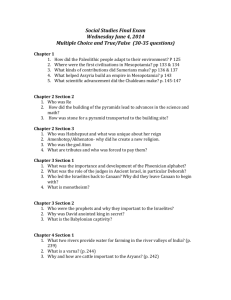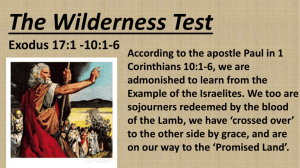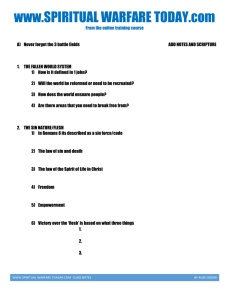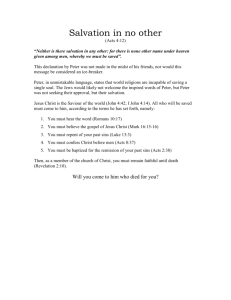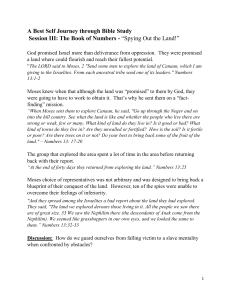20150802 - Oaks Bible Church
advertisement
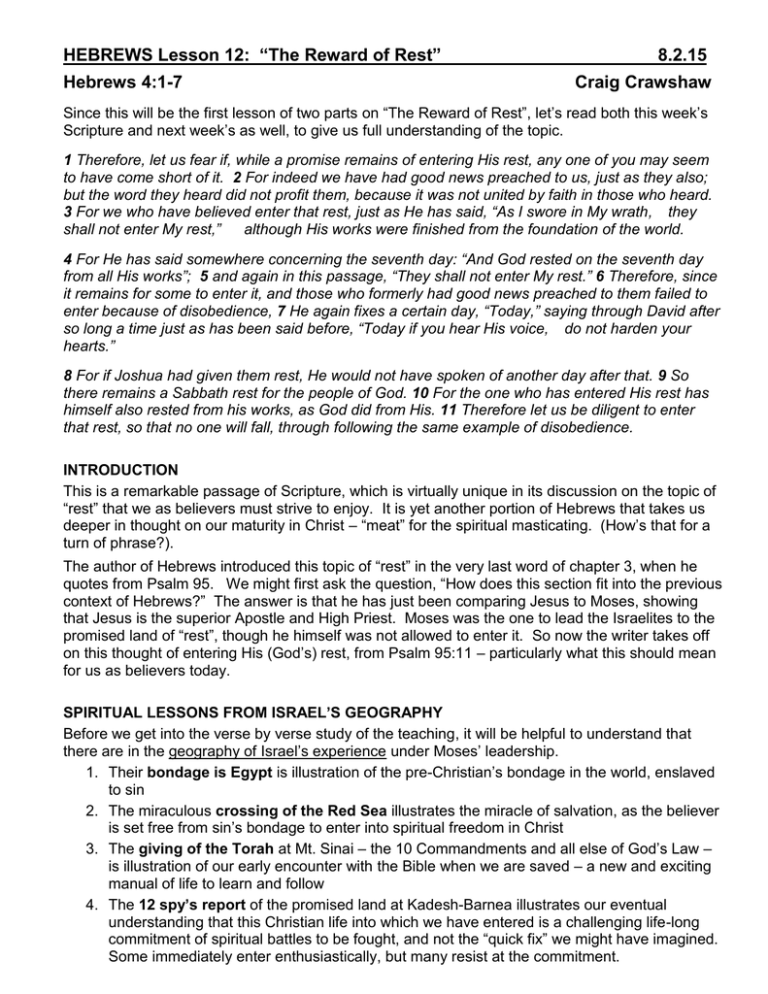
HEBREWS Lesson 12: “The Reward of Rest” Hebrews 4:1-7 8.2.15 Craig Crawshaw Since this will be the first lesson of two parts on “The Reward of Rest”, let’s read both this week’s Scripture and next week’s as well, to give us full understanding of the topic. 1 Therefore, let us fear if, while a promise remains of entering His rest, any one of you may seem to have come short of it. 2 For indeed we have had good news preached to us, just as they also; but the word they heard did not profit them, because it was not united by faith in those who heard. 3 For we who have believed enter that rest, just as He has said, “As I swore in My wrath, they shall not enter My rest,” although His works were finished from the foundation of the world. 4 For He has said somewhere concerning the seventh day: “And God rested on the seventh day from all His works”; 5 and again in this passage, “They shall not enter My rest.” 6 Therefore, since it remains for some to enter it, and those who formerly had good news preached to them failed to enter because of disobedience, 7 He again fixes a certain day, “Today,” saying through David after so long a time just as has been said before, “Today if you hear His voice, do not harden your hearts.” 8 For if Joshua had given them rest, He would not have spoken of another day after that. 9 So there remains a Sabbath rest for the people of God. 10 For the one who has entered His rest has himself also rested from his works, as God did from His. 11 Therefore let us be diligent to enter that rest, so that no one will fall, through following the same example of disobedience. INTRODUCTION This is a remarkable passage of Scripture, which is virtually unique in its discussion on the topic of “rest” that we as believers must strive to enjoy. It is yet another portion of Hebrews that takes us deeper in thought on our maturity in Christ – “meat” for the spiritual masticating. (How’s that for a turn of phrase?). The author of Hebrews introduced this topic of “rest” in the very last word of chapter 3, when he quotes from Psalm 95. We might first ask the question, “How does this section fit into the previous context of Hebrews?” The answer is that he has just been comparing Jesus to Moses, showing that Jesus is the superior Apostle and High Priest. Moses was the one to lead the Israelites to the promised land of “rest”, though he himself was not allowed to enter it. So now the writer takes off on this thought of entering His (God’s) rest, from Psalm 95:11 – particularly what this should mean for us as believers today. SPIRITUAL LESSONS FROM ISRAEL’S GEOGRAPHY Before we get into the verse by verse study of the teaching, it will be helpful to understand that there are in the geography of Israel’s experience under Moses’ leadership. 1. Their bondage is Egypt is illustration of the pre-Christian’s bondage in the world, enslaved to sin 2. The miraculous crossing of the Red Sea illustrates the miracle of salvation, as the believer is set free from sin’s bondage to enter into spiritual freedom in Christ 3. The giving of the Torah at Mt. Sinai – the 10 Commandments and all else of God’s Law – is illustration of our early encounter with the Bible when we are saved – a new and exciting manual of life to learn and follow 4. The 12 spy’s report of the promised land at Kadesh-Barnea illustrates our eventual understanding that this Christian life into which we have entered is a challenging life-long commitment of spiritual battles to be fought, and not the “quick fix” we might have imagined. Some immediately enter enthusiastically, but many resist at the commitment. 5. The wandering in the wilderness illustrates the result of balking at the required journey to holiness and Christ-likeness. This is the experience of believers who will not claim their spiritual inheritances by faith, not submitting to God’s Word and living in restless wandering. 6. The river Jordan illustrates the crossing by faith and submission to God’s Word into a life of sanctification and willingness to be molded by God into His likeness 7. Canaan, the promised land, represents our spiritual inheritance in Christ in this life – a life of challenges, with victory after victory over self and sin – growing more like Jesus day by day Note: Many old hymns, spirituals and even sermons have wrongly led us to believe that crossing the river Jordan illustrates physical death, and entering Canaan is our entrance into heaven. Not only is this never indicated in Scripture to be the case, but Canaan was full of battles, struggles and even defeats – hardly illustrative of our eternal rest in heaven. With this critical understanding, let us move on to examine the multiple implications of the word “rest” in this section of Scripture. THE MEANING OF “REST” First, know that the author uses two totally different words for “rest” in the original Greek language of the epistle. In verses 1-7 he uses “katapausis” – from which we get the English words “pause” and “respose.” It is rightly translated as “rest.” But in verses 8-11 he uses a different Greek word, found only here in the New Testament: “sabbatismos” – or as we might make it say in English, a “sabbatism” or time of Sabbath rest. Again, “rest” is an appropriate translation, but it is important to understand that there must be a subtle but important distinction in the meanings, as we will see (mostly next week). 1. Sabbath rest. This meaning comes from the author’s reference to the 7th day of creation in verse 4. This is God’s rest from the work of creation. 2. Canaan rest. This meaning comes from the Psalm 95 passage and its use in Hebrews, referring to the fact that God did not allow the Israelites to enter the promised land. 3. Christian rest (we can call it) as indicated in verse 3 where “we who have believed enter that rest” and that we must be diligent to enter it (verses 1,3, 6, 9-11). This is submitting to God’s work in us. The “Sabbath rest” is a picture of our rest in Christ through salvation. As we accept Christ’s death on the cross as our own, we “rest” from our works of trying to earn favor with God and by faith enter into the “rest” of God’s grace and forgiveness. The “Canaan rest” into which the Israelites entered after crossing the Jordon is a picture of our “Christian rest” that we enjoy when we submit to God’s working in our life to conform us into His image – whatever the cost. THE TRAIN OF THOUGHT √ “Rest” has been available since creation (4:4, 10) salvation = rest from the “work” of being good enough for God √ Most Israelites failed to enter their promised “rest” (4:6) √ David spoke of “rest” still available (4:7) √ Joshua did not give the people “rest” (4:8) √ There is a spiritual “rest” still available (4:9) sanctification = rest from the “work” of becoming like Christ DUAL PHASES EXPRESSED DIFFERENTLY That our earthly Christian experience of salvation has two distinct phases is acknowledged in most every flavor of denomination. √ Our Nazarene friends speak of being “saved” and “sanctified” as if they are two distinct spiritual acts. We see sanctification as a process rather than as an event. √ Our more liturgical friends speak of being “saved” and “catechized” and see the latter as a step into a second or deeper phase of faith. √ We often hear testimonies of people who were “saved” at an earlier age, but then “rededicated” their life to Christ which propelled them into a deeper walk √ Often the act of water baptism, especially when done a while after receiving Christ as Savior, acts as a step toward a richer commitment and submission to Christ √ Our Pentecostal friends speak of a “second blessing” or “full gospel” as a step to a deeper relationship with Christ. We believe that the Holy Spirit enters at salvation, but acknowdlege that often a deeper understanding of the Spirit’s role in our life can lead to a closer walk. TEACHINGS VERSE BY VERSE Vs. 1. “Therefore” refers to the fact that most all of the Israelites did not enter the promised land. “We must fear” and “come short of it” means that we should have a serious degree of concern that we may be missing some of our promised spiritual inheritance in this life . Notice it is “His rest” for us, and His rest for Himself that we miss. God too longs for the rest that comes from our yieldedness to Him. Vs. 2. Like the Israelites, we have heard the offer of God to bless and transform us, but It is our lack of FAITH and trust in God that can keep us from receiving (profiting in) this transformation Vs. 3 There is a specific spiritual REST into which we can choose to enter as a Christian – or not, just as the Israelites chose to not enter their Canaan rest. This is different from God’s Sabbathsalvation “rest” which has been available even from creation. Vs. 4 Genesis 2:2 tells us that God rested from His works of creation on the seventh day. Vs. 5 And in Psalm 95:11 David tells us that like the wandering Israelites, even now the disobedient, unyielding Christian will not enter into God’s rest. Vs. 6 Here is says that “there remains for some to enter it” That means that some Christians today have not yet entered into “His rest” promised for them in this life. And like the wandering Israelites, these Christians fail to enter it because of “disobedience” – or trust, or submission to God working in their lives in certain areas. Vs. 7. The specific appropriate “day” for submission to God is “TODAY” – meaning every and any day, just as it was for David in his day. If and when you hear God’s voice – through circumstances, Bible reading or any other source – respond, with a tender and submissive heart to do His will in your life. I suggest that this “REST” that we are taught can be missed (v. 1) and told to receive by faith (v. 2) and urged to enter into (v. 3, 6, 11) is a similar “second phase” of our Christian salvation. SO WHAT IS THIS “REST” BEYOND OUR SALVATION? SANCTIFICATION – the process of becoming more like Christ (Rom. 8:29) SUBMISSION – giving Christ the permission to change us SURRENDER – yielding to His will for you in a specific area Psalm 46:10 “Cease striving and know that I am God Like the Israelites experienced in Canaan - there are still battles to be fought. And some will end in temporary defeat and some in victory. But all will move us forward in the ultimate conquest as we fight for His righteousness in our life. It won’t be all “milk and honey” – there will still be some tough times of discipline and challenging circumstance. But as we learn to trust Him through them all, they will ultimately give us “rest” even through the storms of life. As we will see more next week, sanctification is not a “one time event” but a life long process. Also submission and surrender must happen over and over again as God challenges us to let go of unrighteousness and put on righteousness. But He does the work in us, just as He did the work in our salvation. We must let go – “cease striving” and partner with Him in allowing Him to do His makeover is us. Next we will continue this lesson on “rest”, focusing on verses 8-11 and especially touch on the Greek work of “sabbatismos.” For now – what is God calling you to submit to Him, that He might transform you into more of the image if Christ???

